Summary Overview
Corporate Cards Market Overview:
The global corporate cards market is experiencing steady growth, driven by increasing demand across various sectors such as business travel, employee expenses, and corporate procurement. Corporate cards are widely used for managing employee spending, improving cash flow management, and increasing operational efficiency. This report provides a comprehensive analysis of procurement trends, focusing on cost control strategies and the use of digital tools to simplify corporate spending processes.
Key future challenges in corporate card procurement include managing fluctuating transaction volumes, mitigating fraud risks, and ensuring compliance with financial regulations. Digital procurement tools and strategic sourcing play a crucial role in optimizing corporate card management and strengthening long-term financial control. As demand for streamlined financial management continues to rise, businesses are turning to market intelligence to enhance efficiency and reduce risks.
The corporate cards market is expected to maintain steady growth through 2032, with key highlights including:
Market Size: The global corporate cards market is projected to reach USD 33.69 billion by 2032, growing at a CAGR of approximately 7.9% from 2024 to 2032.
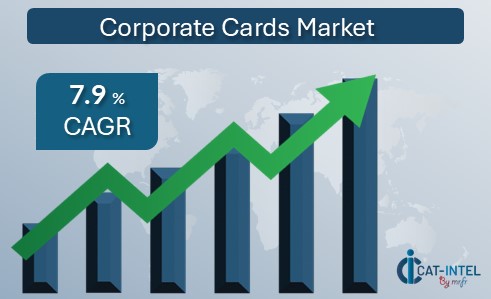
Growth Rate: 7.9%
Sector Contributions: The market's expansion is driven by:
Business Travel: Increasing corporate travel spending, particularly in sectors like consulting, technology, and manufacturing.
Employee Spending Management: Growing need for better tracking and management of employee expenses across industries.
Technological Transformation and Innovations: Advances in card technology, such as the introduction of contactless payments, mobile wallet integration, and enhanced security features, are improving usability and compliance.
Investment Initiatives: Companies are investing in automated expense management systems and analytics tools to improve financial visibility and reduce administrative overhead.
Regional Insights: North America remains a dominant region in corporate card usage due to the high adoption of digital payment solutions and business travel requirements.
Key Trends and Sustainability Outlook:
Digital Integration: Automation in corporate card issuance and expense tracking is enhancing efficiency, reducing administrative errors, and simplifying expense approval processes.
Advanced Security Features: Enhanced security measures, such as biometric authentication and real-time transaction monitoring, are ensuring fraud prevention and compliance with financial regulations.
Focus on Sustainability: A growing trend toward offering eco-friendly corporate cards made from recyclable materials and adopting sustainable business practices in financial management.
Customization Trends: Increasing demand for corporate cards tailored to specific corporate needs, such as travel rewards, spend caps, or integration with internal accounting systems.
Data-Driven Financial Management: The use of big data and analytics tools to optimize spending patterns, improve decision-making, and drive financial efficiencies.
Growth Drivers:
Business Travel Growth: Increasing demand for corporate travel, particularly in industries like consulting and technology, is driving the adoption of corporate cards.
Expense Control: Companies are looking for better ways to control employee spending and streamline their expense reporting processes.
Regulatory Compliance: Stringent regulations and reporting requirements are pushing companies to adopt corporate cards that offer enhanced tracking and transparency features.
Sustainability Initiatives: Firms are investing in corporate cards with features that support green initiatives, such as environmentally friendly materials and responsible spending practices.
Customization: Companies are seeking specialized corporate card solutions that align with their unique business needs, especially in industries such as travel, retail, and manufacturing.
Overview of Market Intelligence Services for Corporate Cards:
Recent analyses have highlighted key challenges such as fluctuating transaction volumes, increasing fraud risks, and the complexity of integrating corporate card solutions with existing financial systems. Market intelligence reports provide actionable insights into procurement opportunities, helping businesses identify cost-saving measures, optimize vendor management, and ensure compliance with evolving financial regulations. These reports also help companies maintain financial visibility, control costs, and reduce risk exposure effectively.
Procurement Intelligence for Corporate Cards: Category Management and Strategic Sourcing:
To remain competitive, companies are enhancing their corporate card procurement strategies by employing spend analysis to monitor usage trends and optimize payment terms. Effective category management and strategic sourcing are crucial to minimizing corporate card costs and ensuring the availability of customized card solutions. By leveraging market intelligence, businesses can refine their procurement processes, secure favourable terms, and improve overall financial management.
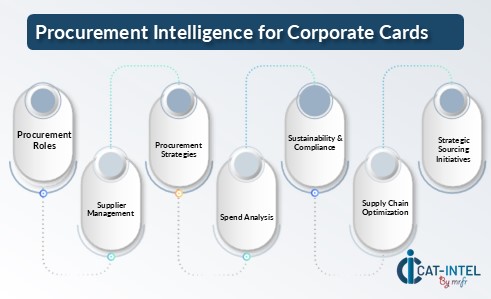
Pricing Outlook for Corporate Cards: Spend Analysis
The pricing outlook for corporate cards is anticipated to remain moderately stable, with potential fluctuations influenced by several factors. Variations in transaction volumes, evolving regulatory requirements, and advancements in technology for security and data integration are significant drivers of pricing trends. Additionally, the rising demand for customized card features, such as rewards programs, expense control tools, and compliance solutions, is contributing to upward pricing pressure.
Graph shows general upward trend pricing for corporate cards and growing demand. However, there may be fluctuations influenced by economic conditions, technological advancements, and competitive dynamic.
Efforts to optimize expense management, adopt advanced fraud prevention systems, and streamline card issuance processes are essential for controlling costs. The adoption of digital solutions, such as real-time expense tracking and automated reconciliation systems, can further enhance cost efficiency.
Partnering with reliable financial institutions, adhering to fair fee structures, and enhancing operational workflows are vital strategies for managing pricing effectively. Despite these challenges, maintaining robust security features, regulatory compliance, and technological innovation will be key to sustaining cost control.

Cost Breakdown for Corporate Cards: Total Cost of Ownership (TCO) and Cost-Saving Opportunities
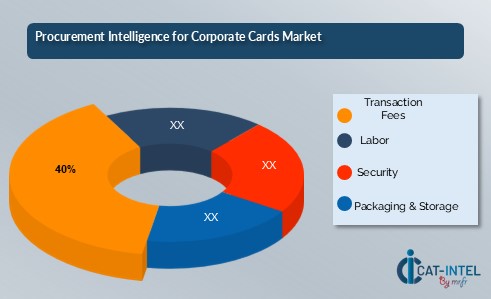
Transaction Fees (40%)
Description: Transaction fees include per-use charges, foreign exchange conversion rates, and cash withdrawal fees. These costs depend on the frequency and nature of corporate card usage.
Trends: Increasing adoption of fee-transparent structures and competitive pricing models by financial institutions are shaping procurement practices. Companies are focusing on leveraging bulk usage agreements to secure cost advantages.
Labor (XX%)
Security (XX%)
Packaging & Storage (XX%)
Cost-Saving Opportunities: Negotiation Levers and Purchasing Negotiation Strategies
In the corporate card industry, streamlining procurement processes and leveraging technology can drive substantial cost savings and operational efficiency. Establishing long-term agreements with financial institutions for bulk issuance or usage can result in reduced fees and preferential terms, effectively lowering the total cost per card. Strategic partnerships with card providers can offer benefits such as enhanced cashback, reduced annual fees, and flexible payment terms.
Investing in advanced technolo gies, including real-time expense tracking systems, automated reconciliation tools, and fraud detection software, can improve financial accuracy, reduce manual errors, and enhance compliance. Additionally, implementing digital platforms for card management and adopting sustainable practices, such as virtual cards, can contribute to operational efficiencies while supporting environmental goals. Diversifying financial partners and adopting multi-provider strategies can mitigate risks of service disruptions, offering increased negotiating leverage during procurement discussions.
gies, including real-time expense tracking systems, automated reconciliation tools, and fraud detection software, can improve financial accuracy, reduce manual errors, and enhance compliance. Additionally, implementing digital platforms for card management and adopting sustainable practices, such as virtual cards, can contribute to operational efficiencies while supporting environmental goals. Diversifying financial partners and adopting multi-provider strategies can mitigate risks of service disruptions, offering increased negotiating leverage during procurement discussions.
Supply and Demand Overview for Corporate Cards: Demand-Supply Dynamics and Buyer Intelligence for Effective Supplier Relationship Management (SRM)
The corporate cards market is experiencing consistent growth, driven by increasing adoption across industries for expense management, travel, and procurement needs. The balance between supply and demand is influenced by factors such as technological innovation, regulatory changes, and evolving business requirements.
Demand Factors:
Corporate Travel Growth: Increased business travel, particularly in industries like consulting, technology, and manufacturing, is boosting demand for corporate cards with travel-specific benefits.
Expense Management Solutions: The growing need for efficient expense tracking and reporting tools is driving the adoption of corporate cards with integrated financial management features.
Regulatory Compliance: Stricter financial reporting standards are increasing demand for cards with enhanced tracking, transparency, and compliance capabilities.
Customization Needs: Rising demand for tailored corporate cards, including features like spend limits, employee-specific benefits, and integration with internal systems, is shaping market trends.
Supply Factors:
Technological Advancements: Innovations such as AI-driven fraud prevention, real-time monitoring, and digital card issuance are enhancing product offerings and supply efficiency.
Service Provider Competition: Increased competition among financial institutions is driving innovation and competitive pricing, offering buyers better terms and features.
Regulatory Alignment: Providers are adapting to regulatory changes by offering cards that meet new compliance requirements, improving buyer confidence and demand.
Operational Efficiency: Enhanced operational capabilities, such as automated systems for card processing and reconciliation, are improving supply quality and reducing lead times.
Regional Demand-Supply Outlook: Corporate Cards
The Image shows growing demand for corporate cards in both North America Asia Pacific and, with potential price increases and increased Competition.
North America: Dominance in the Corporate Cards Market
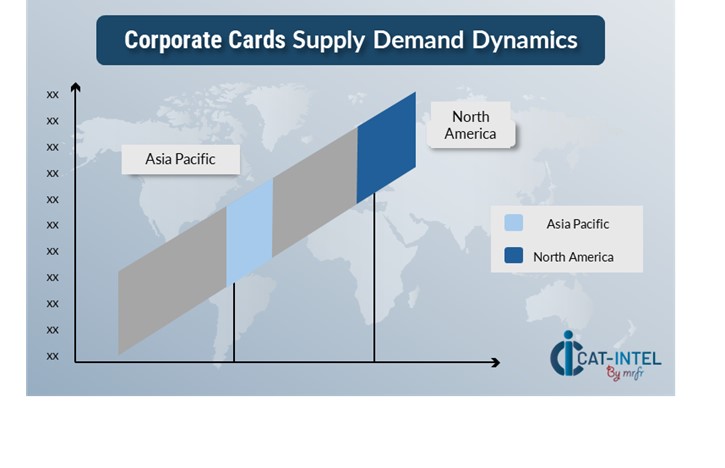
The North American region, particularly the United States and Canada, maintains a leading position in the global corporate cards market, supported by several critical factors:
Established Financial Ecosystem: North America benefits from a mature financial services industry with well-established providers offering diverse corporate card solutions.
Advanced Digital Infrastructure: The region leverages cutting-edge technologies for digital card management, real-time tracking, and fraud prevention, enhancing efficiency and user experience.
High Corporate Spending: Businesses in North America account for significant spending on corporate cards, driven by large-scale operations and substantial travel and expense budgets.
Regulatory Compliance Leadership: Providers in the region ensure adherence to stringent financial regulations, instilling trust and driving demand for secure and compliant corporate card solutions.
Focus on Sustainability and Innovation: North American companies are prioritizing eco-friendly card options, such as virtual cards and paperless statements, while adopting innovative features to meet diverse corporate needs.
North America Remains a key hub Corporate Cards price drivers Innovation and Growth.
Supplier Landscape: Supplier Negotiations and Strategies
The supplier landscape in the corporate cards market is highly competitive, with global and regional providers contributing significantly to the industry's growth. These suppliers influence critical factors, such as pricing, product offerings, and service efficiency. The market is dominated by multinational financial institutions and payment networks, while smaller, niche players focus on customized solutions for specific business needs, such as expense management and compliance tracking.
The supplier ecosystem, particularly in key financial hubs, is diverse, comprising established leaders and innovative emerging providers catering to both global and local demands. As businesses increasingly adopt advanced and integrated corporate card solutions, suppliers are prioritizing innovation, seamless digital integration, and strategic partnerships to strengthen their market position and meet the growing demand for secure, efficient, and customizable offerings.
Key Suppliers in the Corporate Cards Market Include:
American Express
JPMorgan Chase
Citibank
Bank of America
HSBC
Barclays
Capital One
Visa
Mastercard
Wells Fargo
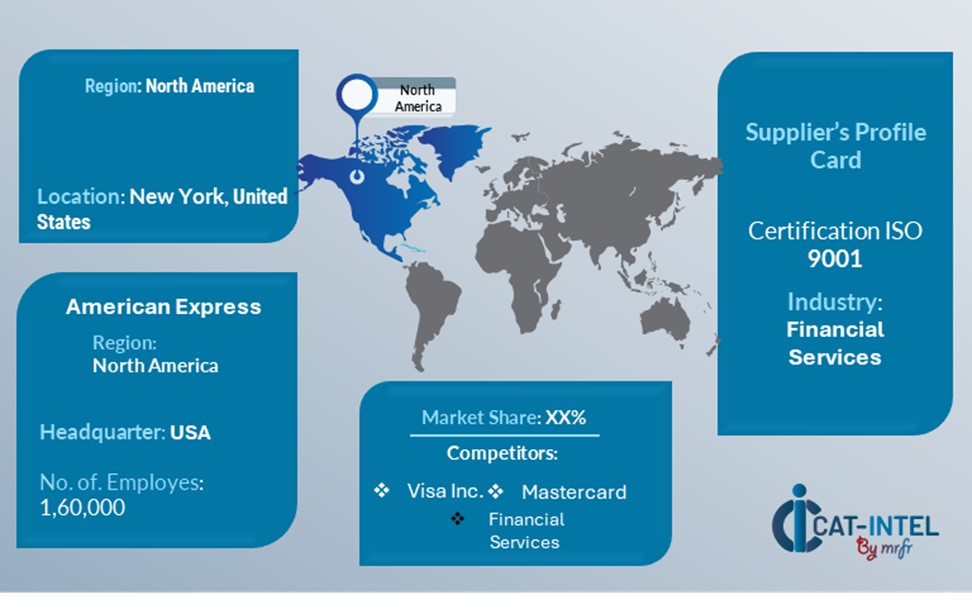
Key Developments Procurement Category Significant Development:
Significant Development |
Description |
Market Growth |
The corporate cards market is expanding, driven by increasing adoption across industries for expense management, travel, and procurement needs. |
Digital Integration |
There is a growing emphasis on integrating corporate cards with digital platforms to provide real-time tracking, automated expense reporting, and enhanced control. |
Product Diversification |
The market is witnessing a rise in customized corporate card offerings, such as virtual cards and cards with industry-specific features for tailored use. |
Technological Innovations |
Advanced technologies like AI-driven fraud prevention, contactless payment systems, and data analytics tools are improving efficiency and security. |
E-commerce Expansion |
The increased use of online platforms for issuing and managing corporate cards is enabling providers to cater to global businesses and streamline services. |
Sustainability Focus |
Growing demand for eco-friendly solutions, such as virtual cards and paperless billing, is aligning with businesses’ sustainability goals and regulatory compliance. |
Corporate Card Attribute/Metric |
Details |
Market Sizing |
The global corporate cards market is projected to reach USD 33.69 billion by 2032, growing at a CAGR of approximately 7.9% from 2024 to 2032. |
Corporate Card Technology Adoption Rate |
Around 55% of companies are adopting advanced technologies, such as AI-driven fraud detection and real-time expense tracking, to enhance financial management. |
Top Corporate Card Strategies for 2024 |
Key strategies include integrating with expense management software, offering customized card solutions, improving transaction security, and aligning with ESG goals. |
Corporate Card Process Automation |
Approximately 40% of companies have automated processes for issuing, tracking, and managing corporate cards to improve efficiency and reduce manual errors. |
Corporate Card Process Challenges |
Major challenges include ensuring data security, managing compliance with financial regulations, reducing operational costs, and catering to diverse business needs. |
Key Suppliers |
Leading providers in the corporate card market include American Express, Visa, and Mastercard, offering tailored solutions for various business sizes and industries. |
Key Regions Covered |
Prominent markets include North America, Europe, and Asia-Pacific, driven by the growing adoption of corporate cards for expense management and procurement. |
Market Drivers and Trends |
Growth is fuelled by the increasing demand for automated expense reporting, real-time tracking, customizable solutions, and secure payment technologies. |










